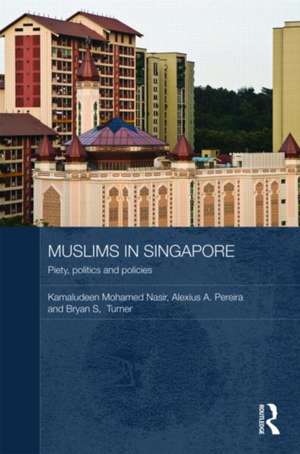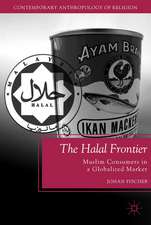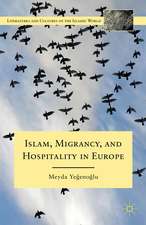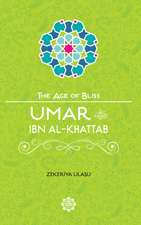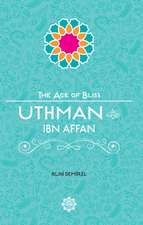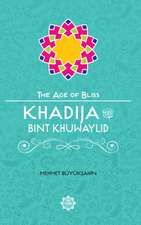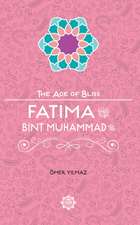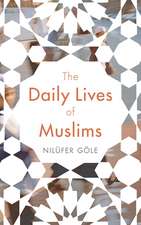Muslims in Singapore: Piety, politics and policies: Routledge Contemporary Southeast Asia Series
Autor Kamaludeen Mohamed Nasir, Alexius Pereira, Bryan S. Turneren Limba Engleză Paperback – 6 mai 2011
| Toate formatele și edițiile | Preț | Express |
|---|---|---|
| Paperback (1) | 321.31 lei 6-8 săpt. | |
| Taylor & Francis – 6 mai 2011 | 321.31 lei 6-8 săpt. | |
| Hardback (1) | 1106.02 lei 6-8 săpt. | |
| Taylor & Francis – 15 sep 2009 | 1106.02 lei 6-8 săpt. |
Din seria Routledge Contemporary Southeast Asia Series
-
 Preț: 310.84 lei
Preț: 310.84 lei -
 Preț: 310.65 lei
Preț: 310.65 lei -
 Preț: 281.72 lei
Preț: 281.72 lei -
 Preț: 310.95 lei
Preț: 310.95 lei -
 Preț: 317.63 lei
Preț: 317.63 lei -
 Preț: 310.96 lei
Preț: 310.96 lei -
 Preț: 320.57 lei
Preț: 320.57 lei -
 Preț: 151.92 lei
Preț: 151.92 lei -
 Preț: 340.61 lei
Preț: 340.61 lei -
 Preț: 318.65 lei
Preț: 318.65 lei - 18%
 Preț: 1058.79 lei
Preț: 1058.79 lei - 18%
 Preț: 1055.21 lei
Preț: 1055.21 lei -
 Preț: 412.57 lei
Preț: 412.57 lei - 41%
 Preț: 238.48 lei
Preț: 238.48 lei - 18%
 Preț: 1054.58 lei
Preț: 1054.58 lei - 18%
 Preț: 1111.51 lei
Preț: 1111.51 lei - 18%
 Preț: 1062.98 lei
Preț: 1062.98 lei - 18%
 Preț: 1166.49 lei
Preț: 1166.49 lei - 18%
 Preț: 1056.28 lei
Preț: 1056.28 lei -
 Preț: 410.28 lei
Preț: 410.28 lei - 18%
 Preț: 1064.70 lei
Preț: 1064.70 lei - 18%
 Preț: 1060.52 lei
Preț: 1060.52 lei - 18%
 Preț: 1057.75 lei
Preț: 1057.75 lei - 18%
 Preț: 708.67 lei
Preț: 708.67 lei - 26%
 Preț: 821.10 lei
Preț: 821.10 lei - 18%
 Preț: 1060.87 lei
Preț: 1060.87 lei - 18%
 Preț: 1057.05 lei
Preț: 1057.05 lei - 25%
 Preț: 825.43 lei
Preț: 825.43 lei - 15%
 Preț: 707.79 lei
Preț: 707.79 lei - 18%
 Preț: 1058.86 lei
Preț: 1058.86 lei - 18%
 Preț: 1280.80 lei
Preț: 1280.80 lei - 25%
 Preț: 824.17 lei
Preț: 824.17 lei - 18%
 Preț: 1004.34 lei
Preț: 1004.34 lei - 26%
 Preț: 820.56 lei
Preț: 820.56 lei - 18%
 Preț: 1064.01 lei
Preț: 1064.01 lei - 18%
 Preț: 736.24 lei
Preț: 736.24 lei - 18%
 Preț: 1164.92 lei
Preț: 1164.92 lei - 18%
 Preț: 1217.95 lei
Preț: 1217.95 lei - 26%
 Preț: 848.03 lei
Preț: 848.03 lei - 18%
 Preț: 1053.47 lei
Preț: 1053.47 lei - 18%
 Preț: 1057.75 lei
Preț: 1057.75 lei - 18%
 Preț: 1053.92 lei
Preț: 1053.92 lei - 18%
 Preț: 1106.02 lei
Preț: 1106.02 lei - 18%
 Preț: 1057.05 lei
Preț: 1057.05 lei - 18%
 Preț: 1060.52 lei
Preț: 1060.52 lei -
 Preț: 428.63 lei
Preț: 428.63 lei -
 Preț: 385.25 lei
Preț: 385.25 lei - 18%
 Preț: 1057.75 lei
Preț: 1057.75 lei
Preț: 321.31 lei
Preț vechi: 369.67 lei
-13% Nou
Puncte Express: 482
Preț estimativ în valută:
61.48€ • 64.36$ • 51.17£
61.48€ • 64.36$ • 51.17£
Carte tipărită la comandă
Livrare economică 31 martie-14 aprilie
Preluare comenzi: 021 569.72.76
Specificații
ISBN-13: 9780415560085
ISBN-10: 041556008X
Pagini: 140
Dimensiuni: 156 x 234 x 14 mm
Greutate: 0.26 kg
Ediția:1
Editura: Taylor & Francis
Colecția Routledge
Seria Routledge Contemporary Southeast Asia Series
Locul publicării:Oxford, United Kingdom
ISBN-10: 041556008X
Pagini: 140
Dimensiuni: 156 x 234 x 14 mm
Greutate: 0.26 kg
Ediția:1
Editura: Taylor & Francis
Colecția Routledge
Seria Routledge Contemporary Southeast Asia Series
Locul publicării:Oxford, United Kingdom
Public țintă
PostgraduateCuprins
List of Tables and Figures Acknowledgements 1: Introduction: Muslims in Multicultural Singapore 2: Understanding Social Enclaves 3: The Malay-Muslim Community: A Background 4: Social Distancing: Halal Consciousness and Public Dining 5: Religious or Public Education? The Madrasah Dilemma 6: The Body and Piety: the Hijab and Marriage 7: Conclusion: States, Enclaves and Religion References Index
Recenzii
At the beginning of the 21st century world-wide religious revivalism and the global war on terror has injected new urgency into long-standing questions regarding state attitudes to the practice of piety among Islamic communities. Employing a theoretically sophisticated framework, this timely book offers a thoughtful case study of the ways in which government management of religious difference has encroached on the lives of Singapore’s Malay Muslims. Informed by an intimate understanding of Singapore society and supported by academic research of high integrity, the analysis gains added authority because of the voices of Muslims themselves are so audible. Muslims in Singapore is a significant contribution not only to Southeast Asian studies but to global conversations regarding the strategies by which states "manage" cultural and religious pluralism.
Barbara Watson Andaya, Professor of Asian Studies, University of Hawai‘i at Manoa
States that, even quite impartially, seek to institute arrangements embodying secularism and multiculturalism end up paradoxically having not just to maintain the religious and cultural arena from a principled distance but to intrude into it as enforcers. Meanwhile, citizens with a powerful sense of religious and cultural identity will seek, under the protection of multiculturalism or against the tenor of forthright secularism, to assert and display publicly their identity and personal commitment. Proud or defiant, such displays all too easily offend those who hold that any such public affirmation is improper——that one may have any identity that one likes so long as one does not confront others with it in what secular liberals like to see as "neutral" public space. Singapore, and especially its Malay Muslim citizens and their relation to the state, provides an instructive test case for the consideration of these dilemmas. This elegant study not only provides a subtle analysis of Singapore’s management of these issues; it makes Singapore’s experience speak to broad global questions about diversity, identity and liberal belief.
Clive Kessler, Emeritus Professor of Sociology, University of New South Wales, Australia
This is a fascinating study of a contemporary multi-faith Asian city state that is both interesting in itself and of much wider relevance. Viewing how Muslims as a minority manage to be devout while fully participating in the benefits of Singaporean economy and society is particularly interesting for Muslim minorities in other advanced societies. Moreover, at a time when states throughout the world have active policies of mangement of religion, to see how Singapore does it is of considerable comparative worth. It not only shows that in an East Asian context secularism does not mean state indifference to religion; it provokes the realisation that secularism does not mean this anywhere. Secularism is the political management of religious people and as such is growing not receding.
Tariq Modood, Professor of Sociology, University of Bristol, UK
"[T]his volume is an exemplary and admirable outcome of a ‘master class’ project led by a world class sociologist, Bryan Turner, whose presence in Singapore has certainly benefited the two young local sociologists who co-authored the book... the book successfully weaves theories, concepts and available empirical evidence into a book that is a must-read, firstly, for those interested in the way Muslim societies interact with non-Muslims and the State in an integrated manner, with all its contradictions, and, secondly, at a more generic level, as a useful example/guide to research into the relationship between religion and the modern state." - A.B. Shamsul, National University of Malaysia (UKM); Journal of Islamic Studies (2011)
Barbara Watson Andaya, Professor of Asian Studies, University of Hawai‘i at Manoa
States that, even quite impartially, seek to institute arrangements embodying secularism and multiculturalism end up paradoxically having not just to maintain the religious and cultural arena from a principled distance but to intrude into it as enforcers. Meanwhile, citizens with a powerful sense of religious and cultural identity will seek, under the protection of multiculturalism or against the tenor of forthright secularism, to assert and display publicly their identity and personal commitment. Proud or defiant, such displays all too easily offend those who hold that any such public affirmation is improper——that one may have any identity that one likes so long as one does not confront others with it in what secular liberals like to see as "neutral" public space. Singapore, and especially its Malay Muslim citizens and their relation to the state, provides an instructive test case for the consideration of these dilemmas. This elegant study not only provides a subtle analysis of Singapore’s management of these issues; it makes Singapore’s experience speak to broad global questions about diversity, identity and liberal belief.
Clive Kessler, Emeritus Professor of Sociology, University of New South Wales, Australia
This is a fascinating study of a contemporary multi-faith Asian city state that is both interesting in itself and of much wider relevance. Viewing how Muslims as a minority manage to be devout while fully participating in the benefits of Singaporean economy and society is particularly interesting for Muslim minorities in other advanced societies. Moreover, at a time when states throughout the world have active policies of mangement of religion, to see how Singapore does it is of considerable comparative worth. It not only shows that in an East Asian context secularism does not mean state indifference to religion; it provokes the realisation that secularism does not mean this anywhere. Secularism is the political management of religious people and as such is growing not receding.
Tariq Modood, Professor of Sociology, University of Bristol, UK
"[T]his volume is an exemplary and admirable outcome of a ‘master class’ project led by a world class sociologist, Bryan Turner, whose presence in Singapore has certainly benefited the two young local sociologists who co-authored the book... the book successfully weaves theories, concepts and available empirical evidence into a book that is a must-read, firstly, for those interested in the way Muslim societies interact with non-Muslims and the State in an integrated manner, with all its contradictions, and, secondly, at a more generic level, as a useful example/guide to research into the relationship between religion and the modern state." - A.B. Shamsul, National University of Malaysia (UKM); Journal of Islamic Studies (2011)
Descriere
This book examines Muslims in Singapore, analysing both their habits, practices and dispositions towards everyday life, and also their role within the broader framework of the secularist Singapore state and its strategies of "managing" cultural and religious pluralism.
